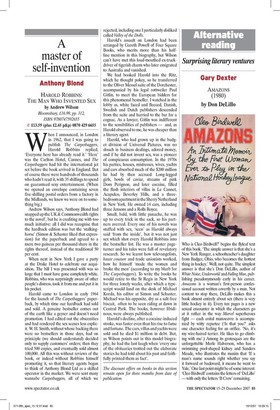A master of self-invention
Anthony Blond HAROLD ROBBINS: THE MAN WHO INVENTED SEX by Andrew Wilson Bloomsbury, £16.99, pp. 312, ISBN 9780747592655 © £13.59 (plus £2.45 p&p) 0870 429 6655 When I announced, in London in 1962, that I was going to publish The Carpetbaggers, Harold Robbins replied, 'Everyone here has already read it.' Here' was the Carlton Hotel, Cannes, and The Calpetbaggers had hit the international jet set before the book arrived in England. But of course there were hundreds of thousands who hadn't read it, with 35 shillings to spend on guaranteed sexy entertainment. (When we opened an envelope containing seven five-shilling postal orders from a factory in the Midlands, we knew we were on to something big.) Andrew Wilson says, 'Anthony Blond had snapped up the UK & Commonwealth rights to the novel', but he is crediting me with too much initiative: all I did was recognise that the hardback edition was but the 'stalkinghorse' (Simon & Schuster liked that expression) for the paperback and agreed to a mere two guineas per thousand share in the rights thereof, instead of the traditional 50 per cent.
When next in New York I gave a party at the Drake Hotel to celebrate our acquisition. The bill I was presented with was so large that I must have gone completely white. Robbins, who was surprisingly aware of other people's distress, took it from me and put it in his pocket.
Harold came to London in early 1964 for the launch of The Calpetbaggers' paperback, by which time our hardback had sold and sold. A genuine bestseller comes out of the earth like a geyser and doesn't need promotion. I had edited out the obscenities and had rendered the sex scenes less explicit. W. H. Smith, without whose backing there were no bestsellers in those days, had on priniciple (we should understand) decided only to supply customers' orders; then they tried 500 copies, and eventually sold almost 100,000. All this was without reviews of the book, or indeed without Robbins himself promoting it, so that literary agents began to think of Anthony Blond Ltd as a skilled operator in the market. We were sent many wannabe Calpetbaggers, all of which we rejected, including one I particularly disliked called Valley of the Dolls.
Harold's assault on London had been arranged by Gareth Powell of Four Square Books, who merits more than his halfline mention in this biography, but Wilson can't have met this loud-mouthed ex-truckdriver of tigerish charm who later emigrated to Australia and vanished.
We had booked Harold into the Ritz, which he thought pokey, so he transferred to the Oliver Messel suite of the Dorchester, accompanied by his legal rottweiler Paul Gitlin, to meet the European bidders for this phenomenal bestseller. I watched in the lobby as, white faced and fleeced, Danish, Swedish and Dutch publishers descended from the suite and hurried to the bar for a cognac. As a lawyer, Gitlin was indifferent to the sensibilities of publishers — and, as Harold observed to me, he was cheaper than a literary agent.
Harold, who had grown up in the budget division of Universal Pictures, was no slouch in business dealings, adored money, and if he did not invent sex, was a pioneer of conspicuous consumption. In the 1970s his parties, houses, mistresses, wives, yachts and cars absorbed much of the $200 million he had by then accrued. Long-legged girls, bowls of caviar, streams of pink Dom Perignon, and later cocaine, filled the flash interiors of villas in Le Cannet, Acapulco, Beverley Hills, and a threebedroom apartment in the Sherry Netherland in New York. He owned 14 cars, including three Jensons and a Rolls Royce.
Small, bald, with little panache, he was up to every trick in the sack, so his partners averred. Every one of his novels was stuffed with sex, 'seen' as Harold always said 'from the inside', but it was not just sex which shot every Harold Robbins into the bestseller list. He was a master pageturner and his tales were full of revelatory research. So we learnt how televangelists, haute couture and trade unionists worked, how he himself 'made the women and broke the men' (according to my blurb for The Carpetbaggers). To write the books he would retire to the St Regis in New York for three lonely weeks, after which a typescript would land on the desk of Michael Korda, his editor at Simon and Schuster. Michael was his opposite, dry as a salt-free biscuit, often to be seen riding at dawn in Central Park. The books, however libidinous, were always published.
Harold's decline, after a cocaine-induced stroke, was faster even than his rise to fame and fortune. The cars, villas and yachts were sold and he died $1 million in debt. But, as Wilson points out in this model biography, he had the last laugh when 'every one of the obituaries trotted out the elaborate stories he had told about his past and faithfully printed them as fact'.
The discount offers on books in this section remain open for three months from date of publication.

































































































 Previous page
Previous page